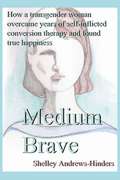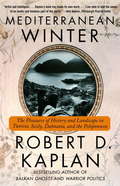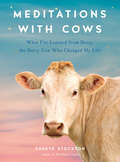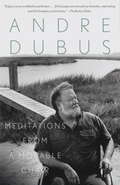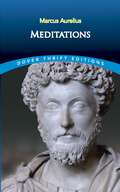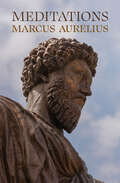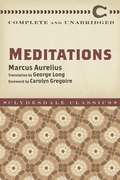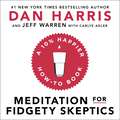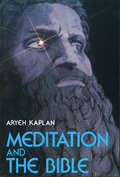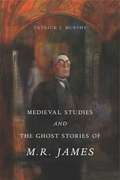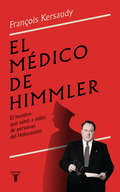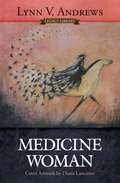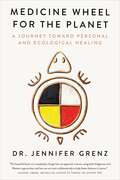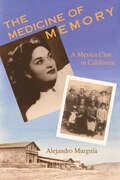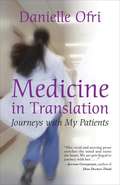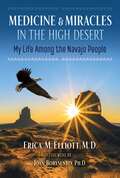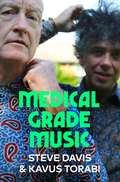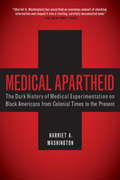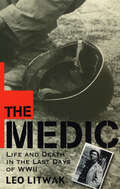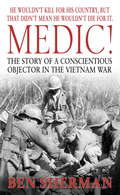- Table View
- List View
Medium Brave: How a Transgender Woman Overcame Years of Self-Imposed Conversion Therapy and Found True Happiness
by Shelley Andrews-HindersMedium Brave is the poignant story of what it was like growing up transgender in 1950s Ohio--the challenges, the confusion, the struggle of growing up different twenty years before the term that defines that condition has even been created. Told with gentle humor, insight, and heartbreaking honesty, Medium Brave will touch the heart, inspire the mind, and encourage any soul still struggling with their authenticity and freedom to find out what it means to be medium brave.
Mediterranean Winter
by Robert D. KaplanIn Mediterranean Winter, Robert D. Kaplan, the bestselling author of Balkan Ghosts and Eastward to Tartary, relives an austere, haunting journey he took as a youth through the off-season Mediterranean. The awnings are rolled up and the other tourists are gone, so the damp, cold weather takes him back to the 1950s and earlier--a golden, intensely personal age of tourism. Decades ago, Kaplan voyaged from North Africa to Italy, Yugoslavia, and Greece, luxuriating in the radical freedom of youth, unaccountable to time because there was always time to make up for a mistake. He recalls that journey in this Persian miniature of a book, less to look inward into his own past than to look outward in order to dissect the process of learning through travel, in which a succession of new landscapes can lead to books and artwork never before encountered.Kaplan first imagines Tunis as the glow of gypsum lamps shimmering against lime-washed mosques; the city he actually discovers is even more intoxicating. He takes the reader to the ramparts of a Turkish kasbah where Carthaginian, Roman, and Byzantine forts once stood: "I could see deep into Algeria over a rib-work of hills so gaunt it seemed the wind had torn the flesh off them." In these austere and aromatic surroundings he discovers Saint Augustine; the courtyards of Tunis lead him to the historical writings of Ibn Khaldun.Kaplan takes us to the fifth-century Greek temple at Segesta, where he reflects on the ill-fated Athenian invasion of Sicily. At Hadrian's villa, "Shattered domes revealed clouds moving overhead in countless visions of eternity. It was a place made for silence and for contemplation, where you wanted a book handy. Every corner was a cloister. No view was panoramic: each seemed deliberately composed." Kaplan's bus and train travels, his nighttime boat voyages, and his long walks in one archaeological site after another lead him to subjects as varied as the Berber threat to Carthage; the Roman army's hunt for the warlord Jugurtha; the legacy of Byzantine art; the medieval Greek philosopher Georgios Gemistos Plethon, who helped kindle the Italian Renaissance; twentieth-century British literary writing about Greece; and the links between Rodin and the Croa-tian sculptor Ivan Mestrovic. Within these pages are smells, tastes, and the profundity of chance encounters. Mediterranean Winter begins in Rodin's sculpture garden in Paris, passes through the gritty streets of Marseilles, and ends with a moving epiphany about Greece as the world prepares for the 2004 Summer Olympics in Athens.Mediterranean Winter is the story of an education. It is filled with memories and history, not the author's alone, but humanity's as well.From the Hardcover edition.
Meditations with Cows: What I've Learned from Daisy, the Dairy Cow Who Changed My Life
by Shreve StocktonAn intimate memoir on the work and wonder of ranch life, critiquing the inhumane and environmentally destructive factory farm system and offering sustainable alternatives for ethical omnivores.Although there are nearly 100 million cattle in the United States, these animals are often ignored or dismissed. In Meditations with Cows, Shreve Stockton inspires a more reverential attitude toward these affectionate and intelligent creatures as she shares captivating stories and photos of ranch life. At the center of the narrative is Daisy, the matriarch of the herd. Through the daily ritual of milking, Stockton forges a relationship with Daisy that deepens with each passing season: "When you have a milk cow, you are together every day, no matter the weather, no matter either of your moods. The hind leg of this twelve-hundred-pound animal towers over you as you crouch beside her... both of you aware of the fact that one well-aimed kick could kill you if she wished. Yet you are allowed to rest your cheek and forehead against her warm belly as you milk... her trust in you entwined with your trust in her, you become family." For anyone who loves animals or cares about the environmental impact of their food, Stockton explores conservation and the important role of cattle in local ecosystems, models the humane treatment of animals, and shows how pastured cattle can be our allies in averting climate crisis. Blending together narrative, science, and thoughtful reflection, Meditations with Cows offers a moving portrait of the rhythms of work, life, and hardship on the ranch.
Meditations from a Movable Chair
by Andre DubusFor Andre Dubus, "the quotidian and the spiritual don't exist on different planes, but infuse each other. His is an unapologetically sacramental vision of life in which ordinary things participate in the miraculous, the miraculous in ordinary things. He believes in God, and talks to Him, and doesn't mince words. He believes in ghosts . . . He is open to mystery, and of all mysteries the one that interests him most is the human potential for transcendence."So wrote Tobias Wolff seven years ago, about Andre Dubus's Broken Vessels, and that insight describes perfectly the twenty-five pieces in this powerfully moving new collection, a continuation of Dubus's candid, intensely personal exploration into matters of morality, religion, and creativity. Since that first book of essays, written after the 1986 accident that cost him his leg and, for a time, the ability to write, Mr. Dubus has published Dancing After Hours, a unanimously heralded book of stories "at once harrowing and exhilarating" (Time). Here is Dubus on the rape of his beloved sister, his first real job, a gay naval officer, Hemingway, the blessing of his first marriage, his dear friend Richard Yates, his own crippling, lost autumnal pleasures, having sons and grandsons, his first books, meeting a woman who witnessed his accident, the Catholic church, and, of course, his faith. A writer of immense sensitivity, vulnerability, and thoughtfulness--a master at the height of his talent--whose work "is suffused with grace, bathed in a kind of spiritual glow" (New York Times Book Review).
Meditations: With Selected Correspondence (Dover Thrift Editions)
by Marcus AureliusOne of the world's most famous and influential books, Meditations, by the Roman emperor Marcus Aurelius (A.D. 121-180), incorporates the stoic precepts he used to cope with his life as a warrior and administrator of an empire. Ascending to the imperial throne in A.D. 161, Aurelius found his reign beset by natural disasters and war. In the wake of these challenges, he set down a series of private reflections, outlining a philosophy of commitment to virtue above pleasure and tranquility above happiness.Reflecting the emperor's own noble and self-sacrificing code of conduct, this eloquent and moving work draws and enriches the tradition of Stoicism, which stressed the search for inner peace and ethical certainty in an apparently chaotic world. Serenity was to be achieved by emulating in one's personal conduct the underlying orderliness and lawfulness of nature. And in the face of inevitable pain, loss, and death -- the suffering at the core of life -- Aurelius counsels stoic detachment from the things that are beyond one's control and a focus on one's own will and perception.Presented here in a specially modernized version of the classic George Long translation, this updated and revised edition is easily accessible to contemporary readers. It not only provides a fascinating glimpse into the mind and personality of a highly principled Roman of the second century but also offers today's readers a practical and inspirational guide to the challenges of everyday life.
Meditations
by Marcus AureliusWisdom from one of the greatest philosophical minds in all of Roman history Divided into twelve books, these meditations chronicle Aurelius&’s personal quest for self-improvement. This enduring text from one of history&’s greatest warriors and leaders has been compared to St. Augustine&’s Confessions for its timelessness, clarity, and candor. These writings, composed between 161 and 180 CE, set forth Aurelius&’s Stoic philosophy and stress the importance of acting in a way that is moral and just rather than self-indulgent. This ebook has been professionally proofread to ensure accuracy and readability on all devices.
Meditations: Complete and Unabridged (Oxford World's Classics)
by Marcus Aurelius Carolyn GregoireAll twelve books by Roman Emperor Marcus Aurelius – his personal guidelines to live and rule well. “Do every deed, speak every word, think every thought in the knowledge that you may end your days any moment.” “We have body, soul, and intelligence. To the body belong the senses, to the soul the passions, to the intelligence principles.” “Think not as your insulter judges or wishes you to judge: but see things as they truly are.” “To pursue impossibilities is madness; and it is impossible that the wicked should not act in some such way as this.” “Order not your life as though you had ten thousand years to live. Fate hangs over you. While you live, while yet you may, be good.”Meditations is a collection of twelve books written by Roman Emperor Marcus Aurelius. This set of book was originally compiled in the form of private journals. Marcus Aurelius used these notes as personal guides to live by and to better himself as a ruler. He compiled these journals during his time as emperor, and while they were not intended for public consumption, there are valuable lessons to be gleaned from his wisdom. The entries include his views of stoicism—the Hellenistic philosophy devoid of “destructive emotions” that could tamper with logic—and its practical use in ruling and military tactics.Completely unabridged, with a new foreword written by Huffington Post writer Carolyn Gregoire, this publication of Meditations is an all-encompassing collection of Marcus Aurelius’s works.
Meditation For Fidgety Skeptics: A 10% Happier How-To Book
by Dan HarrisABC News anchor Dan Harris used to think that meditation was for people who collect crystals, play the pan pipes, and use the word namaste without irony. After he had a panic attack on live television, he went on a strange journey that ultimately led him to become one of meditation's most vocal public proponents. <p><p>Science suggests that meditation can lower blood pressure, mitigate depression and anxiety, and literally rewire key parts of the brain, among numerous other benefits. And yet there are millions of people who want to meditate but aren't actually practising. What's holding them back? <p><p>In this guide to mindfulness and meditation for beginners and experienced meditators alike, Harris and his friend Jeff Warren, embark on a cross-country quest to tackle the myths, misconceptions, and self-deceptions that stop people from meditating. They rent a rock-star tour bus and travel across the US, talking to scores of would-be meditators, including parents, police officers, and even a few celebrities. They create a taxonomy of the most common issues ("I suck at this," "I don't have the time," etc.) and offer up science-based life hacks to help people overcome them. <p><p>The book is filled with game-changing and deeply practical meditation instructions. Amid it all unspools the strange and hilarious story of what happens when a congenitally sarcastic, type-A journalist and a groovy Canadian mystic embark on an epic road trip into America's neurotic underbelly, as well as their own.
Meditation And The Bible
by Aryeh KaplanA highly radical interpretation of the Bible demonstrating the methods of meditation used by the Prophets to attain their unique states of consciousness. First English translation from ancient unpublished manuscripts, with commentary.
Medieval Studies and the Ghost Stories of M. R. James (G - Reference, Information and Interdisciplinary Subjects)
by Patrick J. MurphyMontague Rhodes James authored some of the most highly regarded ghost stories of all time—classics such as “Oh, Whistle, and I’ll Come to You, My Lad” that have been adapted many times over for radio and television and have never gone out of print. But while James is best known as a fiction writer and storyteller, he was also a provost of King’s College, Cambridge, and Eton College, and a legendary and influential scholar whose pioneering work in the study of biblical texts and medieval manuscripts, art, and architecture is still relevant today.In Medieval Studies and the Ghost Stories of M. R. James, Patrick J. Murphy argues that these twin careers are inextricably linked. James’s research not only informed his fiction but also reflected his anxieties about the nature of academic life and explored the delicate divide between professional, university men and erratic hobbyists or antiquaries. Murphy shows how detailed attention to the scholarly inspirations behind James’s fiction provides considerable insight into a formative moment in medieval studies, as well as into James’s methods as a master stylist of understated horror.During his life, James often claimed that his stories were mere entertainments—pleasing distractions from a life largely defined by academic discipline and restraint—and readers over the years have been content to take him at his word. This intriguing volume, however, convincingly proves otherwise.
Medieval Studies and the Ghost Stories of M. R. James
by Patrick J. MurphyMontague Rhodes James authored some of the most highly regarded ghost stories of all time—classics such as “Oh, Whistle, and I’ll Come to You, My Lad” that have been adapted many times over for radio and television and have never gone out of print. But while James is best known as a fiction writer and storyteller, he was also a provost of King’s College, Cambridge, and Eton College, and a legendary and influential scholar whose pioneering work in the study of biblical texts and medieval manuscripts, art, and architecture is still relevant today.In Medieval Studies and the Ghost Stories of M. R. James, Patrick J. Murphy argues that these twin careers are inextricably linked. James’s research not only informed his fiction but also reflected his anxieties about the nature of academic life and explored the delicate divide between professional, university men and erratic hobbyists or antiquaries. Murphy shows how detailed attention to the scholarly inspirations behind James’s fiction provides considerable insight into a formative moment in medieval studies, as well as into James’s methods as a master stylist of understated horror.During his life, James often claimed that his stories were mere entertainments—pleasing distractions from a life largely defined by academic discipline and restraint—and readers over the years have been content to take him at his word. This intriguing volume, however, convincingly proves otherwise.
The Medieval Python: The Purposive and Provocative Work of Terry Jones (The New Middle Ages)
by R. F. Yeager Toshiyuki TakamiyaThis is a collection of essays by diverse hands engaging, interrogating, and honoring the medieval scholarship of Terry Jones. Jones' life-long engagement with the Middle Ages in general, and with the work of Chaucer in particular, has significantly influenced contemporary understanding of the period generally, and Middle English letters in particular. Both in film of all types - full-feature comedy (Monty Python and the Holy Grail) as well as educational television series for BBC, the History Channel, etc. (e.g., Medieval Lives) - and in his published scholarship (e.g., Chaucer's Knight, in original and revised editions, Who Murdered Chaucer?), Jones has applied his unique combination of carefully researched scholarship, keen intelligence, fearless skepticism of establishment thinking, and his broad good humor to challenge, enlighten and reform. No one working today in either Middle English studies or in period-related film and/or documentary can proceed untouched by Jones' purposive, provocative views. Jones, perhaps more than any other medievalist, can be said to be an integral part of what Palgrave deems the "common dialogue."
Medieval Music, Legend, and the Cult of St. Martin
by Yossi MaureySt Martin of Tours was a protector saint of numerous French kings. His was one of the most successful saintly cults in medieval Europe, and the city of Tours functioned as a religious metropolis, drawing pilgrims from all over the continent. Until now, little has been known about how St Martin came to inspire such a lively folkloric tradition, numerous works of art, and the establishment of thousands of churches and numerous confraternities. In this book, Yossi Maurey addresses these questions by focusing on the church dedicated to the saint in Tours, which acted as the crucible for Martin's cult. Maurey explores the music and liturgy of the cult - the most effective means of its dissemination - to reveal its enormous diffusion and impact. Building a more concrete picture of how saints' cults operated and shaped medieval realities, this book also provides new insights into the interactions between contemporary religion, art and politics.
Medieval Lives: or, Eight Charismatic Men and Women of the Middle Ages
by Norman CantorVery accurate biographical segments that look like short stories
El médico de Himmler: El hombre que salvó a miles de personas del Holocausto
by François KersaudyLa verdadera historia de la lista de Kersten, un relato desconocido de terror, fanatismo, generosidad y heroísmo. Hasta las figuras más temibles de la historia tienen sus debilidades, y la de Heinrich Himmler fue sin duda su médico, cuyas manos milagrosas eran las únicas capaces de aliviar sus insoportables calambres abdominales. Felix Kersten, nacido en Estonia y formado por un maestro tibetano en Finlandia, era uno de los fisioterapeutas más prestigiosos de los años treinta, con una agenda internacional de pacientes y un buen patrimonio. En 1939, recibió la petición de atender a Himmler y, tras vencer sus dudas iniciales, se convirtió en su médico personal o, en palabras del Reichsführer, en su «Buda mágico». En lugar de recibir honorarios, pidió que le remuneraran mediante la liberación de judíos y combatientes de la resistencia. Todos conocemos a Oskar Schindler, que salvó a mil judíos durante la Segunda Guerra Mundial. Pero sabemos mucho menos de la hazaña de Kersten y, sin embargo, el Congreso Judío Mundial estableció en 1947 que este hombre había salvado en Alemania a «unos cien mil prisioneros de distintas nacionalidades, entre ellos sesenta mil judíos, arriesgando su vida», una cifra sin duda subestimada. Para seguirle los pasos a Kersten, François Kersaudy, gran especialista en la Segunda Guerra Mundial, se ha sumergido en diarios, notas y declaraciones en seis lenguas de los principales protagonistas, y emplea todo este material para narrar de un modo admirable esta trama sin un ápice de ficción. La crítica ha dicho: «Kersten no alcanzó una gloria similar a la de Schindler. ¿Por qué? Esta obra -rigurosa, minuciosa, implacable- le otorga un reconocimiento tardío».Le Point «Increíble pero cierto. Kersaudy conoce los misterios del régimen nazi como la palma de su mano, y le ofrece la consagración histórica a estehéroe a la vez grandioso y modesto».Le Figaro
Medicine Woman (Medicine Woman Series)
by Lynn V. AndrewsThe first in the late Lynn Andrews&’s widely popular and visionary Medicine Woman series, this book will encourage you to find your own sacred feminine power.Join Lynn V. Andrews in her pivotal book Medicine Woman, following her journey as an American Indian art collector turned shaman initiate. While visiting an art gallery in Beverly Hills, Lynn sees an image of a rare American Indian basket, which immediately captivates her and haunts her dreams. Upon calling the gallery the following day, she finds that it has mysteriously disappeared. Through a series of serendipitous events, Lynn eventually finds herself in the wilderness of Manitoba to locate a Cree woman named Agnes Whistling Elk, who is said to know the location of the sacred marriage basket and could help Lynn retrieve it. But once up north, Lynn finds more than she bargained for. The evil shaman Red Dog has stolen the marriage basket from Agnes. Agnes asks fellow wise woman Ruby Plenty Chiefs to help her teach Lynn their sacred ways before she attempts to steal it back. From there, Lynn is instructed to become a huntress, invite her wolf-self forward to better serve her on her mission, and to learn to embrace her own sacred medicine. Will Lynn find the feminine power within herself in time to face and defeat Red Dog once and for all?
Medicine Wheel for the Planet: A Journey Toward Personal and Ecological Healing
by Jennifer GrenzA personal journey of bringing together Western science and Indigenous ecology to transform our understanding of the human role in healing our planetI used to be an ecologist. . . . Now, I am a community gatherer, working to help bring healing beyond just the land. I am a story-listener. I am a storyteller. I am a shaper of ecosystems. I work on bringing communities together, in circle, to listen to each other. A farm kid at heart, and a Nlaka&’pamux woman of mixed ancestry, Dr. Jennifer Grenz always felt a deep connection to the land. However, after nearly two decades of working as a restoration ecologist in the Pacific Northwest, she became frustrated that despite the best efforts of her colleagues and numerous volunteers, they weren&’t making the meaningful change needed for plant, animal, and human communities to adapt to a warming climate. Restoration ecology is grounded in an idea that we must return the natural world to an untouched, pristine state, placing humans in a godlike role—a notion at odds with Indigenous histories of purposeful, reciprocal interaction with the environment. This disconnect sent Dr. Grenz on a personal journey of joining her head (Western science) and her heart (Indigenous worldview) to find a truer path toward ecological healing. In Medicine Wheel for the Planet, building on sacred stories, field observations, and her own journey, Dr. Grenz invites readers to share in the teachings of the four directions of the medicine wheel: the North, which draws upon the knowledge and wisdom of elders; the East, where we let go of colonial narratives and see with fresh eyes; the South, where we apply new-old worldviews to envision a way forward; and the West, where a relational approach to land reconciliation is realized. Eloquent, inspiring, and disruptive, Medicine Wheel for the Planet circles around an argument that we need more than a singular worldview to protect the planet and make the significant changes we are running out of time for.
The Medicine of Memory: A Mexica Clan in California
by Alejandro MurguíaAn American Book Award winner&’s creative memoir &“traces his own family's history, as well as the long story of Hispanics in America . . . Spirited writing&” (Library Journal). People who live in California deny the past, asserts Alejandro Murguía. In a state where what matters is keeping up with the current trends, fads, or latest computer gizmo, no one has the time, energy, or desire to reflect on what happened last week, much less what happened ten years ago, or a hundred. From this oblivion of memory, he continues, comes a false sense of history, a deluded belief that the way things are now is the way they have always been. In this work of creative nonfiction, Murguía draws on memories—his own and his family&’s reaching back to the eighteenth century—to (re)construct the forgotten Chicano-indigenous history of California. He tells the story through significant moments in California history, including the birth of the mestizo in Mexico, destruction of Indian lifeways under the mission system, violence toward Mexicanos during the Gold Rush, Chicano farm life in the early twentieth century, the Chicano Movement of the 1960s, Chicano-Latino activism in San Francisco in the 1970s, and the current rebirth of Chicano-Indio culture. Rejecting the notion that history is always written by the victors, and refusing to be one of the vanquished, he records, and draws us into, his own California history.
Medicine in Translation: Journeys with My Patients
by Danielle OfriFor two decades, Dr. Danielle Ofri has cared for patients at Bellevue, the oldest public hospital in the country and a crossroads for the world's cultures. In Medicine in Translation, she introduces us, in vivid, moving portraits, to the patients she has known. They have braved language barriers, religious and racial divides, and the emotional and practical difficulties of exile in order to access quality health care. Sharing their journeys with them over the years, Danielle has witnessed some of their best and worst moments, and come to admire their resilience and courageous spirit. Danielle introduces us to her patients: Samuel Nwanko, who was brutally attacked by a Nigerian cult in his homeland and is attempting to create a new life in America; Jade Collier, an Aussie who refuses to let a small thing like a wheelchair keep her from being a homegrown ambassador to New York City; Julia Barquero, a Guatemalan woman who migrated to the States to save her disabled son but cannot obtain the lifesaving heart transplant she needs because she is undocumented. We meet a young Muslim woman threatened at knifepoint for wearing her veil, and the spitfire Señora Estrella, one of Danielle's many Spanish-speaking patients, whose torrent of words helps seal Danielle's resolve to improve her own Spanish, an essential skill in today's urban hospitals. And so she, her husband, and their two young children and seventy-five-pound dog relocate to Costa Rica, where they discover potholes the size of their New York City apartment, a casual absence of street signs or even street names, tangy green-skinned limon dulce dangling in the playground, and sudden rains surging over the craggy edges of roadside ditches. Ultimately, Danielle experiences being a patient in a foreign country when she gives birth to their third child, a "Costarricense" girl. With controversy over immigrants in our society escalating, and debate surrounding health-care reform becoming increasingly urgent, Ofri's riveting stories about her patients could not be more timely. Living and dying in the foreign country we call home, they have much to teach us about the American way, in sickness and in health.
Medicine and Miracles in the High Desert: My Life among the Navajo People
by Erica M. Elliott• Details the author&’s time living with the Navajo people as a teacher, sheepherder, and doctor and her profound experiences with the people, animals, and spirits • Shows how she learned the Navajo language to bridge the cultural divide • Reveals the miracles she witnessed, including her own miracle when the elders prayed for healing of a tumor on her neck • Shares her fearsome encounters with a mountain lion and a shape-shifting &“skin walker&” and how she fulfilled a prophecy by returning as a doctor In 1971, Erica Elliott arrived on the Navajo reservation as a newly minted schoolteacher, knowing nothing about her students or their culture. After a discouraging first week, she almost leaves in despair, unable to communicate with the children or understand cultural cues. But once she starts learning the language, the people begin to trust her, welcoming her into their homes and their hearts. As she is drawn into the mystical world of Navajo life, she has a series of profound experiences with the people, animals, and spirits of Canyon de Chelly that change her life forever.In this compelling memoir, the author details her time living with the Navajo, the Diné people, and her experiences with their enchanting land, healing ceremonies, and rich traditions. She shares how her love for her students transformed her life as well as the lives of the children. She reveals the miracles she witnessed during this time, including her own miracle when the elders prayed for healing of a tumor on her neck. She survives fearsome encounters with a mountain lion and a shape-shifting &“skinwalker.&” She learns how to herd sheep, make fry bread, and weave traditional rugs, experiencing for herself the life of a traditional Navajo woman.Fulfilling a Navajo grandmother&’s prophecy, the author returns years later to serve the Navajo people as a medical doctor in an underfunded clinic, delivering numerous babies and treating sick people day and night. She also reveals how, when a medicine man offers to thank her with a ceremony, more miracles unfold. Sharing her life-changing deep dive into Navajo culture, Erica Elliott&’s inspiring story reveals the transformation possible from immersion in a spiritually rich culture as well as the power of reaching out to others with joy, respect, and an open heart.
The Medicean Succession
by Gregory MurryIn 1537, Florentine Duke Alessandro dei Medici was murdered by his cousin and would-be successor, Lorenzino dei Medici. Lorenzino's treachery forced him into exile, however, and the Florentine senate accepted a compromise candidate, seventeen-year-old Cosimo dei Medici. The senate hoped Cosimo would act as figurehead, leaving the senate to manage political affairs. But Cosimo never acted as a puppet. Instead, by the time of his death in 1574, he had stabilized ducal finances, secured his borders while doubling his territory, attracted an array of scholars and artists to his court, academy, and universities, and, most importantly, dissipated the perennially fractious politics of Florentine life. Gregory Murry argues that these triumphs were far from a foregone conclusion. Drawing on a wide variety of archival and published sources, he examines how Cosimo and his propagandists successfully crafted an image of Cosimo as a legitimate sacral monarch. Murry posits that both the propaganda and practice of sacral monarchy in Cosimo's Florence channeled preexisting local religious assumptions as a way to establish continuities with the city's republican and renaissance past. In "The Medicean Succession," Murry elucidates the models of sacral monarchy that Cosimo chose to utilize as he deftly balanced his ambition with the political sensitivities arising from existing religious and secular traditions.
Medical Grade Music
by Steve Davis Kavus TorabiThe story of two outsiders and obsessives whose collision prompted an evangelistic alliance on the furthest frontiers of underground music.Steve Davis first met Kavus Torabi - guitarist with Gong, Guapo, Cardiacs and Knifeworld - in the mid-2000's at a gig by French underground rock legends Magma. Over the next few years, this unlikely duo's shared affinity for visionary psychedelic music would become the foundation of not only a firm friendship, but also the most infectiously inclusive broadcasting style since the much-mourned death of John Peel. In their weekly radio shows and a one-of-a-kind live DJ roadshow which included a legendary appearance at Glastonbury, Steve and Kavus mapped out a musical landscape of rare enchantment, where the only passport needed was a pair of open ears. No-one, least of all Davis and Torabi themselves, was expecting the 6-time former World Snooker champion and a British-Iranian underground rock musician to become one of the most trusted brands in British alternative music.As Steve and Kavus were starting to get to grips with the challenge of their newfound status, events took a further unexpected turn. Suddenly they found themselves in a band together. And not just any band ... as two thirds of Britain's (if not the world's) leading harmonium, guitar and analogue synth power-trio (with Michael J.York of Coil)The Utopia Strong, the two friends found themselves plunging into a vortex of spontaneous compositional excitement. How Steve and Kavus pulled this off is just one of the many questions MEDICAL GRADE MUSIC will try to answer. Part sonic memoir, part Socratic dialogue, part gonzo mission to the heart of what makes music truly psychedelic this book is the first work of joint autobiography to ever trace the evolution of a life-changing friendship through the discographies of Gentle Giant and Voivod. From the chip-shops of Plumstead to the the wildest shores of Plymouth's nineties thrash scene. it's a funny and fearless buddy movie of the soul, with a soundtrack that will make your eyes bleed.
Medical Apartheid: The Dark History of Medical Experimentation on Black Americans from Colonial Times to the Present
by Harriet A. WashingtonNATIONAL BOOK CRITICS CIRCLE AWARD WINNER • The first full history of Black America&’s shocking mistreatment as unwilling and unwitting experimental subjects at the hands of the medical establishment. No one concerned with issues of public health and racial justice can afford not to read this masterful book."[Washington] has unearthed a shocking amount of information and shaped it into a riveting, carefully documented book." —New York TimesFrom the era of slavery to the present day, starting with the earliest encounters between Black Americans and Western medical researchers and the racist pseudoscience that resulted, Medical Apartheid details the ways both slaves and freedmen were used in hospitals for experiments conducted without their knowledge—a tradition that continues today within some black populations.It reveals how Blacks have historically been prey to grave-robbing as well as unauthorized autopsies and dissections. Moving into the twentieth century, it shows how the pseudoscience of eugenics and social Darwinism was used to justify experimental exploitation and shoddy medical treatment of Blacks. Shocking new details about the government&’s notorious Tuskegee experiment are revealed, as are similar, less-well-known medical atrocities conducted by the government, the armed forces, prisons, and private institutions. The product of years of prodigious research into medical journals and experimental reports long undisturbed, Medical Apartheid reveals the hidden underbelly of scientific research and makes possible, for the first time, an understanding of the roots of the African American health deficit. At last, it provides the fullest possible context for comprehending the behavioral fallout that has caused Black Americans to view researchers—and indeed the whole medical establishment—with such deep distrust.
The Medic: Life and Death in the Last Days of WWII
by Leo LitwakLeo Litwak was a university student when he joined the Army to fight in World War II, "a na've, callow eighteen-year-old son prepared to join other soldier boys being hauled off to war." In 1944 he found himself in Belgium, in the middle of the waning European war, a medic trained to save lives but often powerless to do much more than watch life slip away. It was hard fighting that took Litwak and his rifle company into the heart of Germany at the close of the war. But Litwak learned there was more to war than fighting, more to understand than maps and ammunition. In the final months of the war, he watched the men in his company tenderly serve food at a Passover seder for a dozen brutalized Jewish women newly liberated from slavery. He watched those same men torture and execute defenseless German soldiers. He fell in love at the Moulin Rouge in a scene straight out of a Toulouse-Lautrec painting. The men in his company were dreamers, thieves, friends, killers, revolutionaries, and heroes. They were the men of their time: sometimes brave, sometimes compassionate, sometimes cruel, sometimes loving, usually scared. They were held together by loyalty, only to be scattered by the war's end. The Medic is the gritty, wise, bighearted, and unflinching account of one man's quest to find sense in war and its aftermath.
Medic!: The Story of a Conscientious Objector in the Vietnam War
by Ben Sherman"On the firing range during the third week of Advanced Individual Training, I put down the handgun I had been assigned and stood back from the shooting podium. The sergeant barked something barely intelligible about six years in Leavenworth Federal Prison for refusing a direct order. I repeated that I wasn't going to train myself to kill anybody. Like falling dominoes, every soldier on the range stopped to turn and look at me. The sergeant called me a coward. I said again that I wasn't going to shoot the pistol. . . " In August 1968, Ben Sherman - then an eighteen year old college sophomore - was drafted, yet another Midwestern boy called to serve his country in the rice paddies of Vietnam. After his attempt for conscientious objector status was refused by the draftboard, Sherman distinguished himself almost immediately upon entering the military: he refused to fire a weapon. Instead, he told his superior officers that he was willing to serve in any capacity that would not require him to carry a gun. Within a few short weeks he found himself in swamps of Vietnam, working as a combat medic. From his start in the morgue, cleaning the bodies of fallen soldiers before they were sent home for burial, to operating on dying men while under front line fire, Sherman's story captures the sounds, smells, and terror of Vietnam as experienced by so many American soldiers who ended up in Vietnam without wanting to be there. Written with a rare combination of humor, honesty,and intelligence, Medic offers a glimpse into a world where unrelenting pressure and unbearable circumstances were common-place, where heroes fell on the battlefield daily, and where one man struggled to keep his conscience clear in the face of unspeakable horror.
